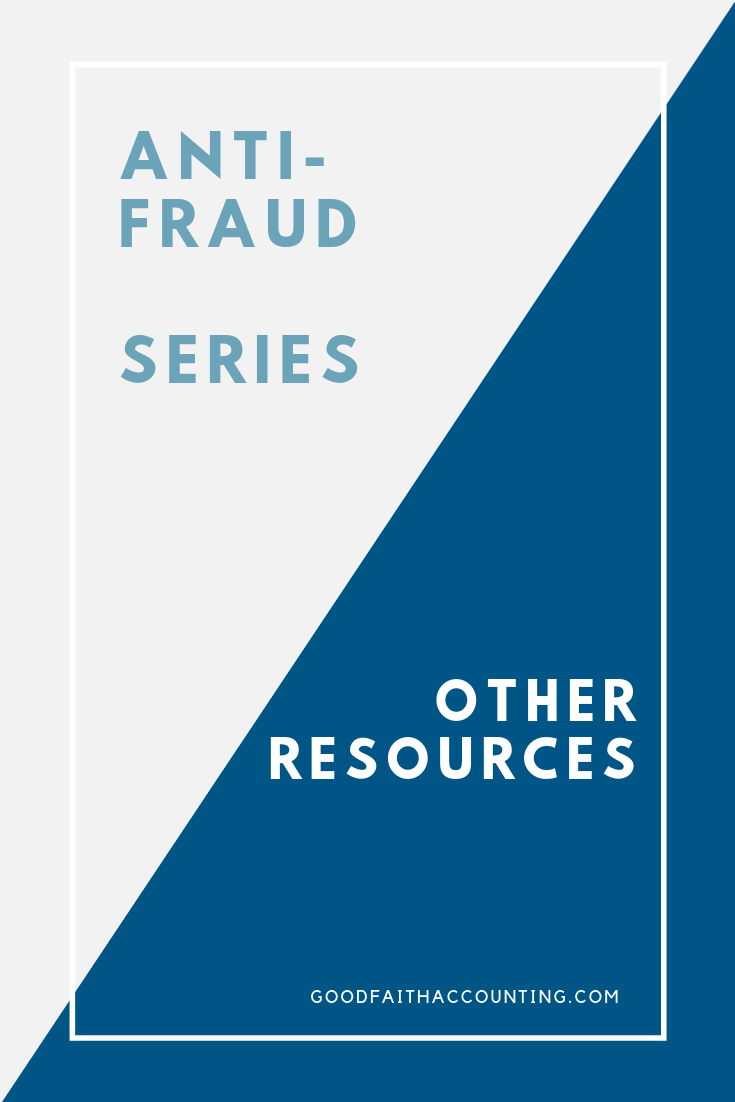June 26, 2019
Anti-Fraud {part 3} – Other Resources

Recap:
In our Anti-Fraud {Part One} article, we defined fraud. In our Anti-Fraud {Part Two} post, we introduced the Fraud Triangle. In Part Three, we will provide a few more resources to help keep your organization above board when it comes to preventing Fraud.
Scroll to the end of this post for free resources – whitepapers and sample worksheets for your ministry to start using right away.
A few more Resources:
1. Internal Controls:
We found this article from our friends at Brotherhood Mutual to be right on track. Specifically their section regarding Financial Irregularities:
Red Flag #1: One person is responsible for it all
“Make more than one person responsible for everything,” Hirschy says. “The person opening the mail shouldn’t be the same person who makes the bank deposit. The individual making payments from an account should be checked by another person who balances the account. Always look for ways to reduce the temptation for those who handle the church’s money.”
Red Flag #2: Counting money alone
Use the rule of twos. At least two unrelated people should collect and count the offering. They also shouldn’t work together during the week or be in a personal financial crisis of any sort.
Red Flag #3: Inadequate supervision
“Always reconcile bank statements and monitor financials monthly,” Hirschy says. “Well-informed church leaders can spot irregularities more easily.” Churches and ministries also should schedule audits by an outside organization regularly.
2. Barriers for Financial Accountability:
Now, we understand you may be feeling that you don’t have the time, talent, or resources to accomplish this overwhelming task of keeping your organization “Fireproof.” We understand, you are a ministry after all. But…we believe we are called to higher standards. To be good stewards of the gifts we’ve received.
“Most churches keep financial records, but not all ministries protect and steward their funds effectively from the ravages of fraud. Stewardship includes more than just keeping records, it requires that one takes proper care in the receiving and spending of His resources.
Also consider Luke 16:10 ‘He who is faithful in a very little thing is faithful also in much; and he who is unrighteous in a very little thing is unrighteous also in much.’”
– used with permission from the Building Trust and Credibility Through Financial Integrity workshop.
Feel free to contact our staff if you have questions regarding where to start in this process or how to afford one of the solutions mentioned.
3. Food for thought:
If we could help reduce fraud in ministry this year, we could provide resources in one of the following areas instead.

4. FREE Resources for your Ministry:
On our Resources page you will find these (and other) free resources for your ministry. Use the search bar to quickly identify which resource you want to find.
Some of the most frequently used resources for Fraud Prevention include:
Credit Card Policy
Offering Counting: descriptions, agreements, counting sheets, & loose check logs
Benevolence Policy
1099 Information
Sample Whistle Blower Policy
Record Retention Guidelines
Stay Connected